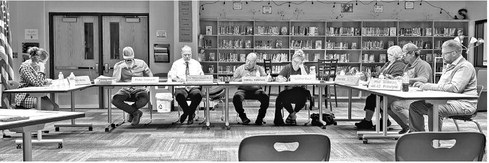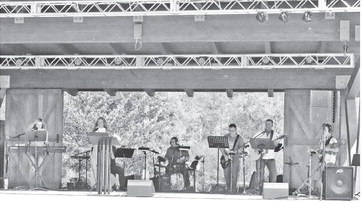Gilman looks at pay for school board members


The Gilman School District’s board members began preparing for their annual meeting during their regular meeting on Monday, September 15.
The annual school district meeting and budget hearing will be held on Monday, October 6, in the district library at 7 p.m. During the meeting, the public will be provided a review of the 2025-2026 budget and vote on the local tax levy needed to implement the budget, though Wisconsin statutes dictate that the school board determines the amount necessary to operate and maintain the school and certifies the final tax levy on or before November 6.
In addition to regular consent items, the electors will have an opportunity to establish board members’ salaries. A suggested motion is to set annual salaries in the amount of $2,400 for the board president, $2,800 for the clerk, and $2,200 for all other board members. In addition, pay for a half-day is suggested at $50 for under four hours, and pay for a full-day is suggested at $100 for over four hours which includes workshops, events, and committee meetings.
The district’s website offers information on annual meetings beginning in 2017 with that year’s agenda stating that both the board president and the clerk’s salaries were suggested at $2,400, remaining at $2,200 for all other members. Though electors upped the clerk’s annual salary to $2,800 in 2020, all other salary amounts have been suggested to remain the same and have not seen other changes since.
Also in 2020 the board began setting pay for both halfand full-day work, though the amounts are not specified on the agendas until 2024, at the same rates suggested on this year’s agenda, $50 for under four hours and $100 for over four hours.
There was some confusion over whether verbiage set forth by the state actually allows board members to have an annual salary as well as pay for workshops, events, and committee meetings.
“You do get to have a voice in that conversation as board members,” said district administrator Walter Leipart.
“You have the power of the vote at the annual meeting, but not when it comes to your personal gain,” board president Darrell Thompson responded.
Board member Valerie Kulesa wondered who would be willing to attend extra trainings and informational meetings available to board members if they did not get paid for their attendance.
“It behooves the community for you to have that information to bring back to the board,” stated board member Holly Bacha.
Ultimately, Leipart decided to check with legal counsel regarding the board’s authority to vote on decisions affecting their personal gain prior to the annual meeting.
In addition, the board had a lengthy discussion about salaries as some board members seem to have heard that citizens are raising concerns over board representatives being paid for district board meetings they are not necessarily attending.
“Whether you make it to the meeting or not, you still have a responsibility as a board member,” said Leipart. “I don’t think bad about anybody missing board meetings.”
Board members questioned setting meetings at a fixed rate by evenly splitting their individual board salaries and possibly giving members leeway to miss one or two meetings.
Thompson brought up the most recent board election which was affected by the passing of Joshua Mann, who had been recently elected. He stated that, when the board encouraged the public to submit letters stating their interest, Derrick Romig was the only candidate who wrote in. Thompson worried that if board members were not paid for additional events or punished for missing meetings, the school could miss out on seeing qualified candidates run for school board in the future.
“People are pulled in many different directions,” he said. “You have a duty and a responsibility beyond sitting at this table.”
The board agreed to have this information prepared for the public by the annual meeting in order to remain transparent and give electors their options.
Additionally, Leipart urged board members to avoid scenarios that could turn into a walking quorum, or the communication between members outside of regular scheduled meetings.
“We’re trying to show that we’re being fiscally responsible, we’re doing our best for our kids, and we’re doing our best for our community, and we’re listening to feedback,” said Leipart.
In other business, the school board: -Learned that the Wisconsin Economic Development Corporation (WEDC) invited the Gilman School District to attend their summit, hosted October 15-16 in Green Bay, to present their work on Design Gilman. A representative from the Village of Gilman plans to attend, and Leipart stated that he intends to invite some students who are involved in the project. Leipart reported that he and the team will present the same information at a convention in Milwaukee for the Wisconsin Association of School Boards (WASB) in 2026.
-Heard from Leipart that the state is talking about creating incentives for consolidation. “Consolidation isn’t always the answer to saving everyone money,” he said. Leipart reported that some in state government believe that the best way to reduce referendums is to consolidate, with some schools in Ohio and Minnesota already consolidating. Board member Philip Grunseth questioned if the state could mandate that schools consolidate with Leipart stating that, with Wisconsin’s history of local control, it doesn’t seem likely.
-Heard that HSR Associates completed taking photos and scans of the school as a part of referendum planning and that they intend to present their findings to the board in the near future.
-Learned that the sound system in the football press box has been updated as the system went down during the first football game of the season.
-Voted unanimously to sign a contract with Olynick Management over Fellanz Excavating, of Boyd, for snow removal. The board opted to sign a two-year contract instead of a four-year contract initially. “Brayden’s done a great job,” said Leipart of Brayden Olynick, owner and operator of Olynick Management, after Olynick’s work regrading the ditch between the school’s baseball diamond and parking lot.
-Changed the wording in the student handbook to allow juniors to leave class early and go to work in accordance with the rules already set in place which ensure classroom attendance and participation. Students are required to share their time cards with principal Phil Tallman or tech ed. teacher Tyler Pockat.
-Learned that verbiage within the student handbook surrounding cell phone use also changed with the removal of the word “encouraged” when stating that students are required to leave their phones in their lockers, as it is a mandatory policy. The district also removed information about cell phone racks in classrooms which are no longer in use. Tallman reported that there have been some incidents of inappropriate cell phone use in the building, resulting in an after-school detention for one student who had their fourth cell phone-related violation.
-Heard information on the long-range facility plan as the district has chillers nearing the end of life with replacement costs looking to be near $180,000. Leipart stated that the middle school portion of the building will need a new central system, but the cost was over $1 million when the district looked into it several years ago before deciding to table the project.
-Discussed their professional learning series with this month’s topic being commitments and expectations. Leipart encouraged the board members to be forthcoming with their expectations of school administration, asking for suggestions on what could be done to help the board continue to operate efficiently. “I think you give us all the information we need,” said Grunseth. “I think everybody wants the school to succeed.”
-Discussed their 2025-2026 budget with plans to approve its publication during the annual meeting. “We do anticipate state equalization going up,” Leipart said. He stated that currently, eSucceed is projected to bring in $500,000 of revenue which could help lower referendum levies. The board hopes to see eSucceed continue to grow and provide revenue in lieu of future referendums. Leipart was able to reduce expenses in Fund 27 by attrition, opting not to replace three full-time positions. “All interventions and special ed. services are being provided, we’re pretty excited about that, showing we’re being as efficient as we can with our funds,” he said. He also stated that family lunch accounts are becoming an issue as some families’ accounts are over $1,000. “We’re working vigorously with those individuals to get it paid, at this point they’re climbing out, we just have not felt in good conscious that we can let a kid go without eating,” Leipart said.



